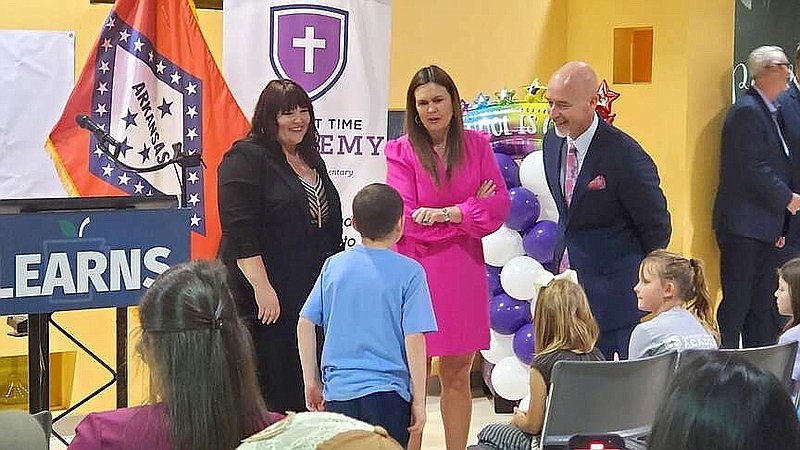A federal judge denied on Wednesday a request by a group of educators, students and the state chapter of the NAACP for an expedited briefing in a lawsuit challenging a section of the LEARNS Act.
In an order filed in the Eastern District of Arkansas, U.S. District Judge Lee Rudofsky said he denied the section of the request because the plaintiffs waited months to file the lawsuit and seek to temporarily halt enforcement of a portion of the law targeting “indoctrination.”
“Plaintiffs could have filed their Complaint and preliminary injunction motion many months ago,” Rudofsky said in the order. “Defendants should not be short-changed on the two weeks provided by the Local Rules to develop their responsive arguments just because Plaintiffs chose not to file for those many months.”
Rudofsky’s order also sets the deadline for the defendants’ response to the plaintiffs’ motion for a preliminary injunction for April 26. However, the court advanced the rest of the preliminary injunction schedule; now, the plaintiffs’ reply is due by the end of April 29.
Rudofsky also extended the deadline for the defendants’ answer or motion to dismiss the case until seven days after the court decides the pending preliminary injunction motion. The court will hold a preliminary injunction hearing at 3 p.m. April 30.
On Tuesday, Arkansas Attorney General Tim Griffin’s office argued in a court filing that the plaintiffs’ request for the injunction should be denied because the group waited more than a year since the law’s passage to file its lawsuit.
The attorney general’s office represents defendants Gov. Sarah Huckabee Sanders, Arkansas Department of Education Secretary Jacob Oliva and the eight members of the state Board of Education in the lawsuit.
The lawsuit’s plaintiffs include Arkansas State Conference of the NAACP, as well as two teachers: Ruthie Walls, who teaches AP African American Studies at Little Rock Central High, and Colton Gilbert, a debate coach and teacher at the school. Three students enrolled in Walls’ class and their parents are also among the plaintiffs: Sadie Annabella and Jennifer Reynolds, as well as Giselle and Chandra Williams Davis. They filed their lawsuit March 25.
They are represented by Laux Law Group and Porter Law Firm, along with David Hinojosa, Maya Brodziak, Chavis Jones and Zakiya Lewis of the nonprofit Lawyers’ Committee for Civil Rights Under Law’s Educational Opportunities Project.
Griffin also urged Rudofsky to set a deadline for defendants to file a responsive pleading to the plaintiffs’ preliminary injunction request “no earlier than May 6,” according to the motion.
Setting the pleading deadline to no earlier than May 6 and extending the preliminary injunction briefing deadline to coincide would help the defendants to file a single brief in support of a motion to dismiss and oppose the plaintiffs’ motion, according to the defendants.
Sanders signed the LEARNS Act on March 14, 2023. An emergency clause attached to the law meant it went into effect immediately. A lawsuit filed May 8 sought to bar the state from enforcing the education law until Aug. 1, arguing lawmakers erred when passing the emergency clause. However, an Arkansas Supreme Court ruling June 15 cleared the way for the law to go into effect.
The plaintiffs’ motion states Section 16 of the LEARNS Act, labeled “Indoctrination,” “unconstitutionally restricts the due process and First Amendment rights of teachers to have adequate notice of how to comply with Section 16 and the First Amendment rights of students to receive information and ideas.” It calls on Rudofsky to issue a preliminary injunction to “protect and restore the rights of students and teachers.”
“Both Teacher and Student Plaintiffs need the Court to consider their claims within the next two weeks to ensure Teacher Plaintiffs are not targeted and sanctioned for violating Section 16,” the motion states.
The defendants’ motion states the plaintiffs admitted knowing the Education Department removed AP approval for the African American Studies course on Aug. 11, “[y]et Plaintiffs took no action for more than eight months, letting nearly the entire school year elapse.”
It argues the plaintiffs “waited weeks” to file a new complaint, filing their motion for a preliminary injunction shortly before midnight April 12.
“Plaintiffs’ actions undermine their second request that the Court ‘expedite briefing and consideration,’” the motion states.
The plaintiffs have upcoming student presentations, beginning April 25 and in May, and those students will present on “topics that could be subjectively interpreted as running afoul of the vague provisions of Section 16,” their own motion states. The student-selected topics include those “where intersectional issues of gender and race will be discussed and the history of slave codes and its impact on racial inequality today.”
Walls and Gilbert are “highly concerned” they could be sanctioned for promoting indoctrination in public schools if they assist students in preparing for their presentations, according to their motion.
Walls also requires the security provided by the injunction to prepare the students in her AP African American Studies course for their May 14 AP exam, plaintiffs state.
Griffin’s office argued the teachers and students have known the presentations were coming “since the beginning of the school year,” and that Walls said she hadn’t removed any specific materials from her curriculum.
“Plaintiffs have known since the beginning of the school year about the circumstances they now contend constitute an emergency and warrant expedited treatment,” the defendants’ motion states. “Only now, at the eleventh hour, do Plaintiffs cry for urgency.”
